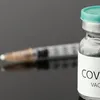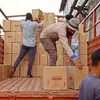Startups fight COVID-19: This startup helps identify people at higher risk of infection
Diagnostic service provider Healthcube has launched CovidSafe, a COVID-19 risk management solution that helps identify people at higher risk of infection through regular checkups and monitoring.
There’s been no letup in India’s second COVID-19 wave. Amid the rising number of coronavirus cases and mortality rate, precautions, pre-screening, and safeguards are the need of the hour.
Bengaluru-based Healthcube, a point-of-care technology-enabled diagnostics services provider, has launched CovidSafe, a COVID-19 risk management solution.

Dr. Ramanan Laxminarayan, Founder of Healthcube [Image Credit: Healthcube]
Speaking with YourStory, Dr Ramanan Laxminarayan, Founder of Healthcube, says, “We wanted to build a solution mainly to assess the risk of infection among individuals. The solution is mainly targeting organisations to help them identify employees who are at a high risk of infection. It can assess the severity of infection to identify individuals who may need early hospitalisation, and prioritises them for an RTPCR test,”
He explains that the solution can be used by workplaces, healthcare providers, and governments to prevent transmission by regular screening and identifying people at higher risk of contracting the virus.
Founded in 2015, Healthcube aims to make diagnosis simple and hassle-free. It provides a portable diagnosis machine, sized the same as a set-up box. According to Dr. Ramanan, the device offers over 30 for tracking several parameters such as vitals, biochemistry, infectious diseases, and cardiac markers.
“Collected data can be accessed using a mobile app and can also be shared with the doctors to make informed decisions,” he adds.
Identifying people with higher risk
Dr Ramanan says the diagnostic solution allows people to regularly take common tests such as D-dimer, CRP, antibody tests, blood pressure, and pulse oxymetry among others. It will also help users in identifying early COVID-19 symptoms and will enable them to connect with doctors for consultation.
“The solution will enable organisations to ensure regular screening of their employees, and keep a check on employees with comorbidities and track their symptoms and risk of COVID-19 infections,” he adds.
According to the founder, the COVID-19 solution has been already deployed by companies such as Tech Mahindra, Tagros Chemicals, Club Mahindra, NICSI, and Jubilant FoodWorks.
Apart from CovidSafe, Healthcube is also working to distribute oxygen cylinders and concentrators under an initiative called OxygenForIndia.
“Some time back, one of my colleagues needed oxygen and was not being able to get it. The effort and rush to arrange oxygen for him made us realise that this will become a major concern for people in India,” Dr Ramanan says.
As a part of the OxygenForIndia initiative, Healthcube raised funds to purchase 2,500 cylinders and concentrators.
“Through OxygenForIndia.Org, the aim is to raise $1,200,000 for providing 3,500 cylinders and 700 concentrators to those who need them the most. Within seven days after it was initiated, OxygenForIndia has received $500,000 in contributions. Around 50 medical oxygen cylinders were delivered to patients in Delhi and 50 oxygen cylinders are on their way,” the company said in a statement.
Dr. Ramanan says Healthcube is currently working on its B2C product and is developing a portable and low-cost version of CovidSafe for ensuring home monitoring of patients.
Edited by Teja Lele









